- Home
- Herman Melville
I and My Chimney Page 3
I and My Chimney Read online
Page 3
Next morning it began again.
"You remember the chimney," said my wife.
"Wife," said I, "it is never out of my house, and never out of my mind."
"But when is Mr. Scribe to begin to pull it down?" asked Anna.
"Not to-day, Anna," said I.
"When, then?" demanded Julia, in alarm.
Now, if this chimney of mine was, for size, a sort of belfry, for ding-donging at me about it, my wife and daughters were a sort of bells, always chiming together, or taking up each other's melodies at every pause, my wife the key-clapper of all. A very sweet ringing, and pealing, and chiming, I confess; but then, the most silvery of bells may, sometimes, dismally toll, as well as merrily play. And as touching the subject in question, it became so now. Perceiving a strange relapse of opposition in me, wife and daughters began a soft and dirge-like, melancholy tolling over it.
At length my wife, getting much excited, declared to me, with pointed finger, that so long as that chimney stood, she should regard it as the monument of what she called my broken pledge. But finding this did not answer, the next day, she gave me to understand that either she or the chimney must quit the house.
Finding matters coming to such a pass, I and my pipe philosophized over them awhile, and finally concluded between us, that little as our hearts went with the plan, yet for peace' sake, I might write out the chimney's death-warrant, and, while my hand was in, scratch a note to Mr. Scribe.
Considering that I, and my chimney, and my pipe, from having been so much together, were three great cronies, the facility with which my pipe consented to a project so fatal to the goodliest of our trio; or rather, the way in which I and my pipe, in secret, conspired together as it were, against our unsuspicious old comrade--this may seem rather strange, if not suggestive of sad reflections upon us two. But, indeed, we, sons of clay, that is my pipe and I, are no whit better than the rest. Far from us, indeed, to have volunteered the betrayal of our crony. We are of a peaceable nature, too. But that love of peace it was which made us false to a mutual friend, as soon as his cause demanded a vigorous vindication. But I rejoice to add, that better and braver thoughts soon returned, as will now briefly be set forth.
To my note, Mr. Scribe replied in person.
Once more we made a survey, mainly now with a view to a pecuniary estimate.
"I will do it for five hundred dollars," said Mr. Scribe at last, again hat in hand.
"Very well, Mr. Scribe, I will think of it," replied I, again bowing him to the door.
Not unvexed by this, for the second time, unexpected response, again he withdrew, and from my wife and daughters again burst the old exclamations.
The truth is, resolve how I would, at the last pinch I and my chimney could not be parted.
"So Holofernes will have his way, never mind whose heart breaks for it," said my wife next morning, at breakfast in that half-didactic, half-reproachful way of hers, which is harder to bear than her most energetic assault Holofernes, too, is with her a pet name for any fell domestic despot. So, whenever, against her most ambitious innovations, those which saw me quite across the grain, I, as in the present instance, stand with however little steadfastness on the defense, she is sure to call me Holofernes, and ten to one takes the first opportunity to read aloud, with a suppressed emphasis, of an evening, the first newspaper paragraph about some tyrannic day-laborer, who, after being for many years the Caligula of his family, ends by beating his long-suffering spouse to death, with a garret door wrenched off its hinges, and then, pitching his little innocents out of the window, suicidally turns inward towards the broken wall scored with the butcher's and baker's bills, and so rushes headlong to his dreadful account.
Nevertheless, for a few days, not a little to my surprise, I heard no further reproaches. An intense calm pervaded my wife, but beneath which, as in the sea, there was no knowing what portentous movements might be going on. She frequently went abroad, and in a direction which I thought not unsuspicious; namely, in the direction of New Petra, a griffin-like house of wood and stucco, in the highest style of ornamental art, graced with four chimneys in the form of erect dragons spouting smoke from their nostrils; the elegant modern residence of Mr. Scribe, which he had built for the purpose of a standing advertisement, not more of his taste as an architect, than his solidity as a master-mason.
At last, smoking my pipe one morning, I heard a rap at the door, and my wife, with an air unusually quiet for her, brought me a note. As I have no correspondents except Solomon, with whom, in his sentiments, at least, I entirely correspond, the note occasioned me some little surprise, which was not diminished upon reading the following:--
"NEW PETRA, April 1st.
"SIR:--During my last examination of your chimney, possibly you may have noted that I frequently applied my rule to it in a manner apparently unnecessary. Possibly also, at the same time, you might have observed in me more or less of perplexity, to which, however, I refrained from giving any verbal expression.
"I now feel it obligatory upon me to inform you of what was then but a dim suspicion, and as such would have been unwise to give utterance to, but which now, from various subsequent calculations assuming no little probability, it may be important that you should not remain in further ignorance of. "It is my solemn duty to warn you, sir, that there is architectural cause to conjecture that somewhere concealed in your chimney is a reserved space, hermetically closed, in short, a secret chamber, or rather closet. How long it has been there, it is for me impossible to say. What it contains is hid, with itself, in darkness. But probably a secret closet would not have been contrived except for some extraordinary object, whether for the concealment of treasure, or what other purpose, may be left to those better acquainted with the history of the house to guess.
"But enough: in making this disclosure, sir, my conscience is eased. Whatever step you choose to take upon it, is of course a matter of indifference to me; though, I confess, as respects the character of the closet, I cannot but share in a natural curiosity.
"Trusting that you may be guided aright, in determining whether it is Christian-like knowingly to reside in a house, hidden in which is a secret closet,
"I remain,"
"With much respect,
"Yours very humbly,
"HIRAM SCRIBE."
My first thought upon reading this note was, not of the alleged mystery of manner to which, at the outset, it alluded--for none such had I at all observed in the master mason during his surveys--but of my late kinsman, Captain Julian Dacres, long a ship-master and merchant in the Indian trade, who, about thirty years ago, and at the ripe age of ninety, died a bachelor, and in this very house, which he had built. He was supposed to have retired into this country with a large fortune. But to the general surprise, after being at great cost in building himself this mansion, he settled down into a sedate, reserved, and inexpensive old age, which by the neighbors was thought all the better for his heirs: but lo! upon opening the will, his property was found to consist but of the house and grounds, and some ten thousand dollars in stocks; but the place, being found heavily mortgaged, was in consequence sold. Gossip had its day, and left the grass quietly to creep over the captain's grave, where he still slumbers in a privacy as unmolested as if the billows of the Indian Ocean, instead of the billows of inland verdure, rolled over him. Still, I remembered long ago, hearing strange solutions whispered by the country people for the mystery involving his will, and, by reflex, himself; and that, too, as well in conscience as purse. But people who could circulate the report (which they did), that Captain Julian Dacres had, in his day, been a Borneo pirate, surely were not worthy of credence in their collateral notions. It is queer what wild whimsies of rumors will, like toadstools, spring up about any eccentric stranger who, settling down among a rustic population, keeps quietly to himself. With some, inoffensiveness would seem a prime cause of offense. But what chiefly had led me to scout at these rumors, particularly as referring to concealed treasure, was the
circumstance, that the stranger (the same who razeed the roof and the chimney) into whose hands the estate had passed on my kinsman's death, was of that sort of character, that had there been the least ground for those reports, he would speedily have tested them, by tearing down and rummaging the walls.
Nevertheless, the note of Mr. Scribe, so strangely recalling the memory of my kinsman, very naturally chimed in with what had been mysterious, or at least unexplained, about him; vague flashings of ingots united in my mind with vague gleamings of skulls. But the first cool thought soon dismissed such chimeras; and, with a calm smile, I turned towards my wife, who, meantime, had been sitting near by, impatient enough, I dare say, to know who could have taken it into his head to write me a letter.
"Well, old man," said she, "who is it from, and what is it about?"
"Read it, wife," said I, handing it.
Read it she did and then--such an explosion! I will not pretend to describe her emotions, or repeat her expressions. Enough that my daughters were quickly called in to share the excitement. Although they had never before dreamed of such a revelation as Mr. Scribe's; yet upon the first suggestion they instinctively saw the extreme likelihood of it. In corroboration, they cited first my kinsman, and second, my chimney; alleging that the profound mystery involving the former, and the equally profound masonry involving the latter, though both acknowledged facts, were alike preposterous on any other supposition than the secret closet.
But all this time I was quietly thinking to myself: Could it be hidden from me that my credulity in this instance would operate very favorably to a certain plan of theirs? How to get to the secret closet, or how to have any certainty about it at all, without making such fell work with the chimney as to render its set destruction superfluous? That my wife wished to get rid of the chimney, it needed no reflection to show; and that Mr. Scribe, for all his pretended disinterestedness, was not opposed to pocketing five hundred dollars by the operation, seemed equally evident. That my wife had, in secret, laid heads together with Mr. Scribe, I at present refrain from affirming. But when I consider her enmity against my chimney, and the steadiness with which at the last she is wont to carry out her schemes, if by hook or by crook she can, especially after having been once baffled, why, I scarcely knew at what step of hers to be surprised.
Of one thing only was I resolved, that I and my chimney should not budge.
In vain all protests. Next morning I went out into the road, where I had noticed a diabolical-looking old gander, that, for its doughty exploits in the way of scratching into forbidden inclosures, had been rewarded by its master with a portentous, four-pronged, wooden decoration, in the shape of a collar of the Order of the Garotte. This gander I cornered, and rummaging out its stiffest quill, plucked it, took it home, and making a stiff pen, inscribed the following stiff note:
"CHIMNEY SIDE, April 2.
Mr. SCRIBE.
"Sir:--For your conjecture, we return you our joint thanks and compliments, and beg leave to assure you, that
"We shall remain,
"Very faithfully,
"The same
"I and my Chimney."
Of course, for this epistle we had to endure some pretty sharp raps. But having at last explicitly understood from me that Mr. Scribe's note had not altered my mind one jot, my wife, to move me, among other things said, that if she remembered aright, there was a statute placing the keeping in private houses of secret closets on the same unlawful footing with the keeping of gunpowder. But it had no effect.
A few days after, my spouse changed her key.
It was nearly midnight, and all were in bed but ourselves, who sat up, one in each chimney-corner; she, needles in hand, indefatigably knitting a sock; I, pipe in mouth, indolently weaving my vapors.
It was one of the first of the chill nights in autumn. There was a fire on the hearth, burning low. The air without was torpid and heavy; the wood, by an oversight, of the sort called soggy.
"Do look at the chimney," she began; "can't you see that something must be in it?"
"Yes, wife. Truly there is smoke in the chimney, as in Mr. Scribe's note."
"Smoke? Yes, indeed, and in my eyes, too. How you two wicked old sinners do smoke!--this wicked old chimney and you."
"Wife," said I, "I and my chimney like to have a quiet smoke together, it is true, but we don't like to be called names."
"Now, dear old man," said she, softening down, and a little shifting the subject, "when you think of that old kinsman of yours, you know there might be a secret closet in this chimney."
"Secret ash-hole, wife, why don't you have it? Yes, I dare say there is a secret ash-hole in the chimney; for where do all the ashes go to that we drop down the queer hole yonder?'
"I know where they go to; I've been there almost as many times as the cat."
"What devil, wife, prompted you to crawl into the ash-hole! Don't you know that St. Dunstan's devil emerged from the ash-hole? You will get your death one of these days, exploring all about as you do. But supposing there be a secret closet, what then? "
"What, then? why what should be in a secret closet but--"
"Dry bones, wife" broke in I with a puff, while the sociable old chimney broke in with another.
"There again! Oh, how this wretched old chimney smokes," wiping her eyes with her handkerchief. "I've no doubt the reason it smokes so is, because that secret closet interferes with the flue. Do see, too, how the jams here keep settling, and it's down hill all the way from the door to this hearth. This horrid old chimney will fall on our heads yet; depend upon it, old man." "Yes, wife, I do depend on it; yes, indeed, I place every dependence in my chimney. As for its settling, I like it. I, too, am settling, you know, in my gait. I and my chimney are settling together, and shall keep settling, too, till, as in a great feather-bed, we shall both have settled away clean out of sight. But this secret oven; I mean, secret closet of yours, wife; where exactly do you suppose that secret closet is?"
"That is for Mr. Scribe to say."
"But suppose he cannot say exactly; what, then?"
"Why then he can prove, I am sure, that it must be somewhere or other in this horrid old chimney."
"And if he can't prove that; what, then?"
"Why then, old man," with a stately air, "I shall say little more about it."
"Agreed, wife," returned I, knocking my pipe-bowl against the jam, "and now, to-morrow, I will a third time send for Mr. Scribe. Wife, the sciatica takes me; be so good as to put this pipe on the mantel."
"If you get the step-ladder for me, I will. This shocking old chimney, this abominable old-fashioned old chimney's mantels are so high, I can't reach them."
No opportunity, however trivial, was overlooked for a subordinate fling at the pile.
Here, by way of introduction, it should be mentioned, that besides the fire-places all round it, the chimney was, in the most hap-hazard way, excavated on each floor for certain curious out-of-the way cupboards and closets, of all sorts and sizes, clinging here and there, like nests in the crotches of some old oak. On the second floor these closets were by far the most irregular and numerous. And yet this should hardly have been so, since the theory of the chimney was, that it pyramidically diminished as it ascended. The abridgment of its square on the roof was obvious enough; and it was supposed that the reduction must be methodically graduated from bottom to top.
"Mr. Scribe," said I when, the next day, with an eager aspect, that individual again came, "my object in sending for you this morning is, not to arrange for the demolition of my chimney, nor to have any particular conversation about it, but simply to allow you every reasonable facility for verifying, if you can, the conjecture communicated in your note."
Though in secret not a little crestfallen, it may be, by my phlegmatic reception, so different from what he had looked for; with much apparent alacrity he commenced the survey; throwing open the cupboards on the first floor, and peering into the closets on the second; measuring one within, and then
comparing that measurement with the measurement without. Removing the fire-boards, he would gaze up the flues. But no sign of the hidden work yet.
Now, on the second floor the rooms were the most rambling conceivable. They, as it were, dovetailed into each other. They were of all shapes; not one mathematically square room among them all--a peculiarity which by the master-mason had not been unobserved. With a significant, not to say portentous expression, he took a circuit of the chimney, measuring the area of each room around it; then going down stairs, and out of doors, he measured the entire ground area, then compared the sum total of all the areas of all the rooms on the second floor with tho ground area; then, returning to me in no small excitement, announced that there was a difference of no less than two hundred and odd square feet--room enough, in all conscience, for a secret closet.
"But, Mr. Scribe," said I stroking my chin, "have you allowed for the walls, both main and sectional? They take up some space, you know."
"Ah, I had forgotten that," tapping his forehead, "but," still ciphering on his paper, "that will not make up the deficiency."
"But, Mr. Scribe, have you allowed for the recesses of so many fire-places on a floor, and for the fire-walls, and the flues; in short, Mr. Scribe, have you allowed for the legitimate chimney itself--some one hundred and forty-four square feet or thereabouts, Mr. Scribe?"
"How unaccountable. That skipped my mind too."
"Did it, indeed, Mr. Scribe?"
He faltered a little, and burst forth with, "But we must not allow one hundred and forty-four square feet for the legitimate chimney. My position is, that within those undue limits the secret closet is contained."
I eyed him in silence a moment; then spoke:
"Your survey is concluded, Mr. Scribe; be so good now as to lay your finger upon the exact part of the chimney wall where you believe this secret closet to be; or would a witch-hazel wand assist you, Mr. Scribe?"
"No, sir, but a crow-bar would," he, with temper, rejoined.
Here, now, thought I to myself, the cat leaps out of the bag. I looked at him with a calm glance, under which he seemed somewhat uneasy. More than ever now I suspected a plot. I remembered what my wife had said about abiding by the decision of Mr. Scribe. In a bland way, I resolved to buy up the decision of Mr. Scribe.

 Moby Dick; Or, The Whale
Moby Dick; Or, The Whale Moby Dick
Moby Dick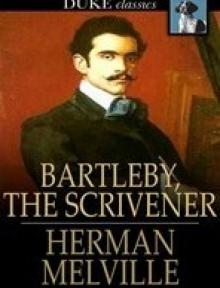 Benito Cereno and Bartleby the Scrivener
Benito Cereno and Bartleby the Scrivener Israel Potter: His Fifty Years of Exile (Annotated Edition)
Israel Potter: His Fifty Years of Exile (Annotated Edition) Billy Budd and the Piazza Tales
Billy Budd and the Piazza Tales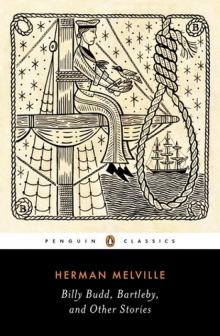 Billy Budd, Bartleby, and Other Stories
Billy Budd, Bartleby, and Other Stories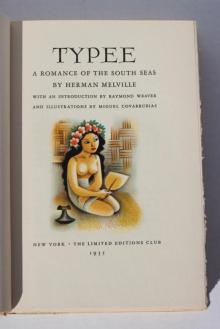 Typee: A Romance of the South Seas
Typee: A Romance of the South Seas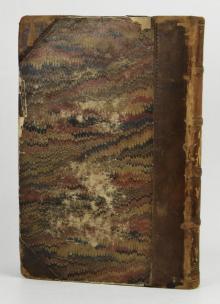 Omoo: Adventures in the South Seas
Omoo: Adventures in the South Seas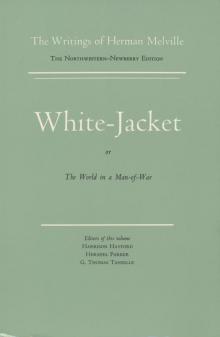 White Jacket; Or, The World on a Man-of-War
White Jacket; Or, The World on a Man-of-War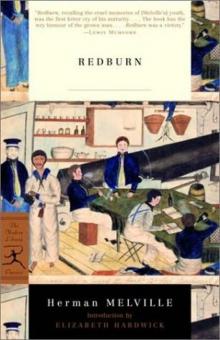 Redburn. His First Voyage
Redburn. His First Voyage Mardi: and A Voyage Thither, Vol. II
Mardi: and A Voyage Thither, Vol. II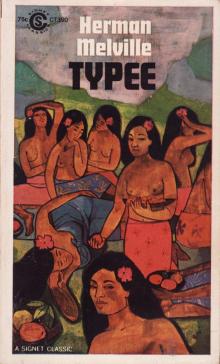 Typee
Typee The Paradise of Bachelors and the Tartarus of Maids
The Paradise of Bachelors and the Tartarus of Maids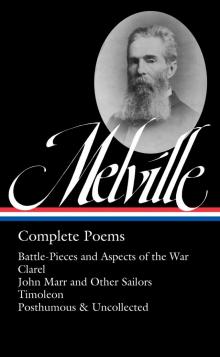 Herman Melville- Complete Poems
Herman Melville- Complete Poems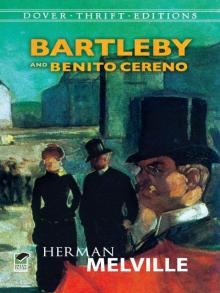 Bartleby and Benito Cereno
Bartleby and Benito Cereno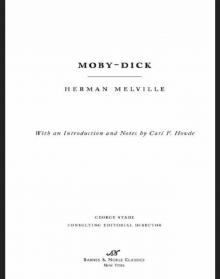 Moby-Dick (Barnes & Noble Classics Series)
Moby-Dick (Barnes & Noble Classics Series) Mardi and a Voyage Thither
Mardi and a Voyage Thither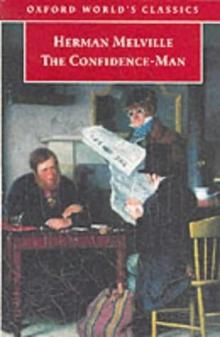 The Confidence-Man
The Confidence-Man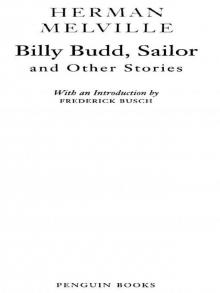 Billy Budd and Other Stories
Billy Budd and Other Stories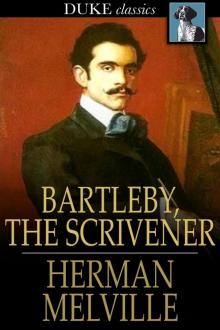 Bartleby the Scrivener
Bartleby the Scrivener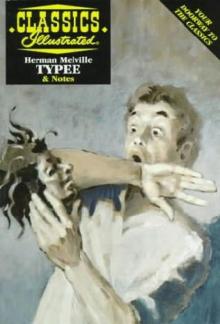 Typee: A Romance of the South Sea
Typee: A Romance of the South Sea I and My Chimney
I and My Chimney Billy Budd
Billy Budd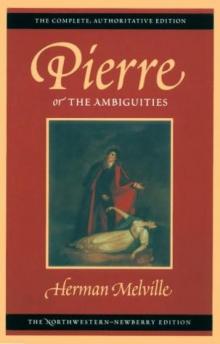 Pierre, Or the Ambiguities
Pierre, Or the Ambiguities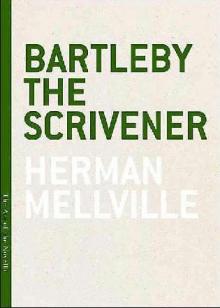 Bartleby, The Scrivener A Story of Wall-Street
Bartleby, The Scrivener A Story of Wall-Street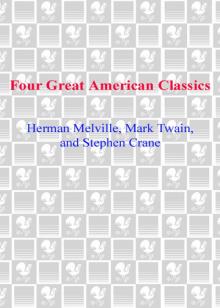 Four Great American Classics
Four Great American Classics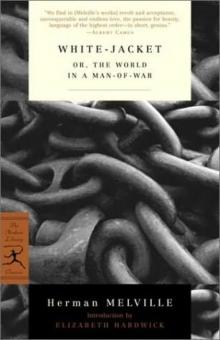 White Jacket or, The World on a Man-of-War
White Jacket or, The World on a Man-of-War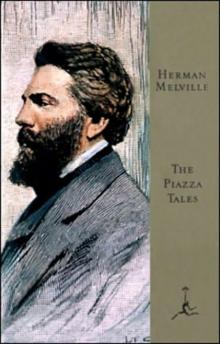 The Piazza Tales
The Piazza Tales Israel Potter. Fifty Years of Exile
Israel Potter. Fifty Years of Exile